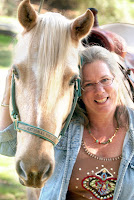by Laura Crum
After
Terri’s sad post yesterday, and the very sad news last week, my own bad news
seems pretty minor. But I’m hoping that telling this story may help someone
else. So here goes.
I posted a while ago about the little horse near the school
playground. See my post on this problem
here. Some of you asked for updates. I
do have an update, but I’m afraid it isn’t good.
The
last I had heard, the SPCA had been called by a “do-gooder” who felt the horse
was too thin. When I came back to the school, five days later (our program only
meets twice a week), the horse was gone. I asked our teacher what had happened;
she didn’t know. So I asked the school secretary and the yard duty supervisor.
The yard duty supervisor said that he had seen someone taking photos of the
horse and the shed last week. The horse was gone when he came to school this
week. He didn’t know more than that. Uh-oh, I thought.
At
a guess the photo-taking person was SPCA. And then the horse disappeared.
I
asked the school secretary. She said she didn’t know much, but one of the
neighbors—not the neighbor with the horse—had said that they had seen a horse
trailer pull into the property on the weekend. They did not see the horse leave
in the trailer. But now the horse is certainly gone. No one at the school knew
more than that.
My
heart just sank. It is possible the horse went to a rescue or was re-homed—but
it’s pretty unlikely, given the
circumstances. Maybe he was euthanised. I don’t like to think about the other
alternative, which is the most likely, unfortunately.
I
don’t like to think about it, but I’m going to spell it out here, in case it
helps some other little horse somewhere. Here is what I said in my previous
post:
“I have been around in the horse business for a long time. I
know the conventional wisdom is to call and report a horse that is too thin. I
also know that this course is as likely to do harm as it is good. Having
watched this horse lead a reasonably contented life for the past eight years, I
certainly would NOT have reported it to the local SPCA.
There
are a number of reasons why I feel this way. First off, I have known of a good
many cases like this where the owner, who never was all that invested in the
horse, simply gets rid of it after the complaint. Trust me, these horses almost
NEVER end up going to a better place. At best they get euthanised. At worst
they end up on a truck. It’s possible that once in awhile the owner takes it as
a wake-up call and buys better feed for the horse. And its possible that one in
awhile the horse is re-homed to a better home. Its possible—but I haven’t seen
it that often. Especially with an older horse.”
Now,
I don’t know for sure what actually happened, and the only way I could find out
would be to knock on the door of complete strangers who have already made their
decision (whatever it was) and probably (and justifiably) feel pretty hostile
towards anyone from the school right now. But from long experience in the horse
world, I can tell you what probably happened.
To
begin with, I can’t know if these people were truly fond of this horse, but I
never saw anyone with him, ever—in eight years. Still, I was only there on
weekday mornings. If the people worked, they wouldn’t have been home then.
Perhaps they lavished attention on him in the evenings and on weekends. In any
case, the horse always looked reasonably content in his small falling-down
pasture and the school kids regularly fed him apples. He wasn’t suffering. Yes,
this fall he was a touch too thin. NOT starving. You could see a shadow of ribs if you stared hard. His ribs
did not stand out, his hip bones did not stick up, his fuzzy winter coat had
some shine to it. He was a LONG way from distress. I know he was being fed, because I saw him eating hay in his shed. As I pointed out in my
previous post, he would undoubtedly have gained weight when the grass came on
strong in the spring.
Now my guess is that the people who owned the horse weren’t
very invested in him (judging by the run-down pasture…etc). Still, the horse
was leading a decent life. I know. I watched him for eight years. The do-gooder
who reported him to the SPCA initiated a predictable chain of events. It
probably went something like this. The SPCA hassled the owners-- who weren’t
wanting to be hassled, and the owners most likely called around until they
found someone who was willing to take the horse off their hands. And I’m sorry
to say it, but that person most likely hauled the horse to a livestock auction
for the small amount of money to be made.
From
the auction the horse was very likely shipped to slaughter. It makes me very
sad.
I
wish I could have done something about this, and I was gearing up to try going
to the door of the house and asking if I could help (as some readers
suggested). But the horse was gone by the time I got back to school. And I will
admit that I was struggling with the question of what I should do or say.
You
see the last two times I interfered in such a situation, I was told that the
person could not afford to feed the horse any more, and would I take said horse.
And both times I took the horse. However, I can no longer take any more horses.
My corrals are full and I am maxed out with seven horses that I am committed to
caring for for the rest of their lives. I had decided that I could offer to buy
some senior food for the horse—but even this was problematic. I could buy a
dozen sacks, sure. But I couldn’t afford to support that horse for the rest of
his life…and the feed needed as a horse gets older can be very expensive.
(Believe me, I know.) Wasn’t I just prolonging the inevitable? Still, if the
horse put on a little weight now, and then the green grass kicked in, he might
have another pleasant year.
Anyway,
I never had the chance to offer anything. Things happened faster than I was
prepared for. But to be realistic, if the people had already made their choice,
there might not have been anything I could do about it if I had gotten there
earlier.
And
here’s my message. Stop and think before you interfere by calling “the
authorities.” If a horse is truly starving that may be the best course of
action. But be aware that when you report a horse like the little horse near
our school, you may be sending that horse to slaughter—as a direct result of
your “do-gooder” action. It might be best to try to determine if the horse has
a decent quality of life FIRST, before you decide to drag in officialdom.
As
a case in point, last fall we euthanised two of our own older rescue horses
mostly because we felt they were too thin. These horses were on free choice hay
and a good pasture and we supplemented with lots of equine senior feed. The
horses had been hard keepers all their lives and we had kept them in decent
shape for many years by pouring LOTS of expensive food to them. But there came
a day when even this wasn’t working any more, and we felt that they were too
thin going into winter. They were 31 and 25 years, respectively. If you had
driven by this pasture and seen that these two looked ribby, sure you could
have called the SPCA. And what good would it have done?
Such
a well meaning do gooder would have no idea that we were pouring tons of money
into expensive feed for these horses (and yes, regular worming) and agonizing
over what was the best and most ethical thing to do. We monitored the horses
carefully, checking to see that they both still seemed to be enjoying life and
feeding them all they would clean up. We shed tears when we decided that
euthanasia was the right option. We did our best to do right by those horses.
We darn sure didn’t need some do-gooder deciding that we were “abusing” them.
Again,
I, too, would report a horse under certain circumstances. But I would try to
find out the circumstances first. People who won’t buy feed when horses are
starving need to be reported. But its best to be sure that the situation that
the horses are in is WORSE than what may happen to them once you report them.
We all need to be clear on that.
OK,
I’ll get off my soapbox now. As I said in the original post, its very hard to
know what’s best to do in a situation like this. But “reporting” the horse very
often leads to the outcome I just described. I think many “do-gooders”
mistakenly suppose that reporting a thin horse will lead to the horse having a
better life. Sometimes this may happen, but very often it doesn’t work like
that. And it’s important to understand this going in.
On
to the good news, which is actually pretty minor in comparison. For those of
you who are reading my mystery series featuring equine veterinarian Gail
McCarthy (on Kindle), the last four books have been reduced in price—just in
time for Xmas. These books have all been previously priced at $10.99, which is
pretty expensive for a Kindle edition, in my opinion. Starting today they are
$2.99 each. The books (in order) are
Moonblind,
Chasing Cans,
Going Gone, and
Barnstorming. Click on the titles to find the $2.99 Kindle editions.
There
has been some problem linking the editions (which should soon be fixed), so if
you simply type in the titles you may not be able to find these editions. But
the links above will take you there; you can also find them if you look for
them under Laura Crum in “Kindle store.”
These
four books are very special to me, and those who read this blog will recognize
some familiar equine characters. I hope this lower price makes it possible for
folks who are enjoying the series to complete it by reading the last four
books.
Season’s
greetings from my family to yours!











































